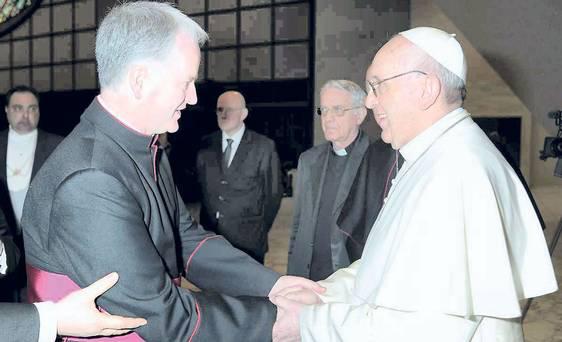|
The Irish priest behind Vatican's digital miracle
By Gerry O'sullivan
Irish Independent
July 19, 2014
http://www.independent.ie/business/technology/news/the-irish-priest-behind-vaticans-digital-miracle-30441967.html
 |
| Social media: Mons. Paul Tighe with Pope Francis. Mons. Tighe will have a key role in the reform plans. |
A Mexican psychologist, a British peer and an Irishman walk into the Vatican. That line might just read like there's a jokey punchline coming (there's not), but the Vatican's latest attempt to reform its communications involves such an international line-up, and the Vatican is very serious.
The international flavour of the committee announced last week to propose – though not to implement – media reforms in the Vatican reflects Pope Francis' determination to bring in outsiders to help the ongoing reform process. Most notable is the committee's chairperson, Lord Patten, a former governor of Hong Kong and former chairman of the BBC Trust.
The Holy See said the new committee would propose reforms and publish a report and plan within 12 months. The other members of the committee are from USA, Germany, France, Mexico, and Singapore.
Representing the Vatican on the committee is Mons. Paul Tighe, secretary of the Pontifical Council for Social Communications, who will act as secretary of the committee. Vatican Radio, the Secretariat of State, and its internet service and newspaper will also be represented.
Mons. Tighe is a Dublin priest, an academic who ran Archbishop Diarmuid Martin's public affairs office and a close friend and confidante of the Archbishop. He worked at the Vatican many years ago and is seen as the Archbishop's eyes and ears in Rome. Although he had no formal qualifications in communications, he was appointed to the Rome post in late 2007. His academic training helped him quickly establish himself in the number two post at the social communications 'ministry' of the Vatican, which liaises with Catholic universities worldwide.
He got a reputation as a hard worker, someone who avoided the ostentation and pomp of the pre-Pope Francis Vatican who was trying to get things done in the Italian dominated bureaucracy.
Under Pope Benedict XVI, reform was thwarted by vested interests and the clerical machinations and PR gaffes at the Vatican frustrated Tighe. Those frustrations came to light thanks to the leaking of US diplomatic cables. In them, Mons. Tighe complains about the Italo-centric nature of the Pope's advisers and their lack of experience. The cables document that he and his boss, Archbishop Celli were pushing for their department to have a greater role on major decisions.
advertisement
Now Mons Tighe has the influence he wanted on Pope Francis' new commission. The body's first job will be to review a report submitted by the global management consulting firm McKinsey and Co. But implementing change is going to be far from simple.
While Mons Tighe was able to push a digital-first agenda, there is little appetite for reform among other Vatican media outlets, especially Vatican Radio, which accounts for almost one third of Vatican expenditure, or Vatican Television or indeed in the arcane halls of the Vatican newspaper, where some reporters reportedly cannot even type.
Mons. Tighe knows that while the Vatican can reach more of the global Catholic population easily and cheaply through digital means (currently 10pc), there is little desire among the institution to recognise the media world has changed radically.
There is a further complication when it comes to unified communications, and that is the Pope.
Only this week, the papal spokesman had to deny the accuracy of a journalist's interview with the Pope, whom he quoted as saying the rule of celibacy could be relaxed over time, and that about 2pc of the clergy where paedophiles, a figure that seems to have no basis.
What's even more odd is this was the second time the Pope has given an interview to a veteran 90-year-old Italian journalist who doesn't takes notes or record the interviews but writes up his report later from memory.
The danger for the Vatican is, however, that it rushes too much toward digital. It has to think globally, and in Asia and Africa, radio and newsprint are still highly consumed.
What's more is that the Vatican can easily become dazzled by the potential reach of platforms such as Twitter, but there is no evidence the extracts from the Pope's speeches affect people in the same way an article, a radio discussion or a TV programme might. Of course, it is cheap and therein lies the major focus of the reform.
However, there are many vested interests in keeping the status quo – not to mention jobs – so the new international committee will be looking to Mons. Tighe to help steer them through the Italian stranglehold on the Vatican.
|
